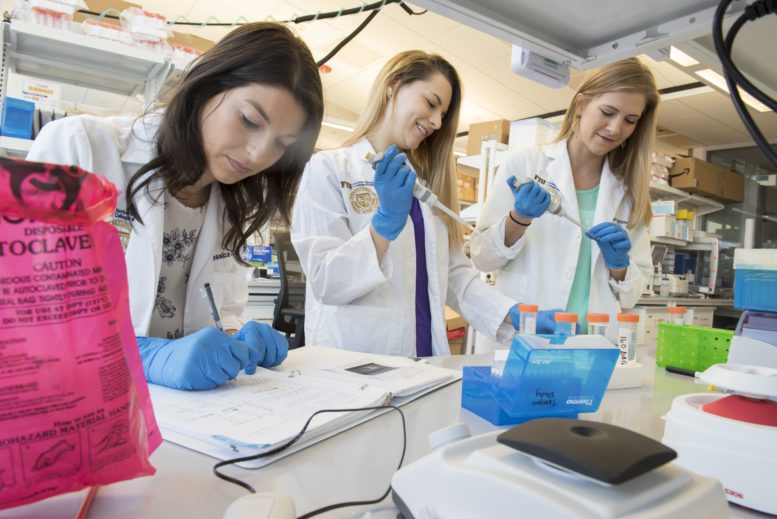
September is Ovarian Cancer Awareness Month. There is no screening test for ovarian cancer. Three FIU medical students would like to change that. They are hoping to save lives by collecting used tampons.

The idea began to germinate when Jessica Seigel, Leah Cohen and Lauren Dittman, who are in their fourth year at Herbert Wertheim College of Medicine, were awarded scholarships by Hearing the Ovarian Cancer Whisper, an organization that supports victims of ovarian cancer and funds education and research of the deadliest of gynecologic cancers. The award allowed them to shadow a gynecologic oncologist.
“During the experience I was shocked to learn how late ovarian cancer patients presented, and most with incurable disease, “ says Cohen, who with her classmates Seigel and Dittman, is conducting a pilot study they hope will lead to development of a screening test. The research is funded by the HERA Foundation.
“Our study is trying to determine whether DNA collected from tampons can be used in the detection of ovarian cancer,” says Dittman.
For most women, the average lifetime risk of developing ovarian cancer is 1.3 percent, but for women who have inherited the breast cancer gene one (BRCA1) mutation, the odds are much higher — 40 to 60 percent. BRCA1 is a gene that produces tumor suppressor proteins. When the gene is mutated, or altered, it does not function properly and can lead to cancer.
Tampon pilot study
The students have collected tampons from 30 women who have tested positive for the BRCA1 mutation. The idea is that cells shed by the fallopian tubes, where ovarian cancer originates, travel down the reproductive tract to the vagina and may be collected in the tampons. DNA extracted from the tampon samples can then be sequenced and analyzed for mutations in the tumor suppressor gene known as TP53 which is a commonly mutated gene in people with cancer.
Dr. Sheldon Cherry— professor of obstetrics and gynecology, and a mentor to the young women since their first year in medical school — suggested the study, based on an earlier tampon study of women who had already developed ovarian cancer and presented a TP53 mutation.
“I thought, ‘why don’t we try to see if we can find this same mutation in seemingly healthy at-risk women before they show clinical signs of cancer,’” says Cherry.
There is no screening test for ovarian cancer
According to the American Cancer Society, in 2018, more than 22,000 new ovarian cancer cases will be diagnosed and more than 14,000 women will die from ovarian cancer. Although this cancer accounts for just 2.5 percent of all female cancer cases, it results in 5 percent of cancer deaths because early ovarian cancer has no obvious symptoms. Even in its late stage, symptoms like back pain, bloating and abdominal pain are common and can be confused with other diseases delaying detection.
One of the biggest obstacles to early detection is that unlike breast cancer and cervical cancer, there is no simple, reliable screening test for ovarian cancer.
“Zero, there’s no way to detect early ovarian cancer unless it’s identified incidentally, but it’s very rarely detected except after it has spread from the ovary, in which case it’s almost uniformly fatal,” says Jeff Boyd, chair of the Department of Human and Molecular Genetics; Boyd’s lab is where the tampon study is being conducted. Boyd is an expert in the genetics and molecular genetics of gynecologic and breast cancers.
That’s why studies like this are so important.
“If successful, this could become a potential method of screening for ovarian cancer. Just like how Pap smears are screening tools to detect changes in cervical cells before it becomes cervical cancer,” says Seigel. And Dittman points out that “using a tampon is an easy, cheap and non-invasive method that many women already use every month.”
They are now collecting samples from a control population – women who do not have the BRCA1 mutation. For more information or to enter the control group write, infotampons@fiu.edu
The students hope to have results by the time they graduate in April 2019.





